15 start with V start with V
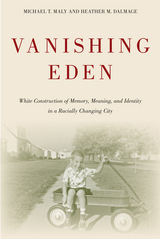
For many whites, desegregation initially felt like an attack on their community. But how has the process of racial change affected whites’ understanding of community and race? In Vanishing Eden, Michael Maly and Heather Dalmage provide an intriguing analysis of the experiences and memories of whites who lived in Chicago neighborhoods experiencing racial change during the 1950s through the 1980s. They pay particular attention to examining how young people made sense of what was occurring, and how this experience impacted their lives.
Using a blend of urban studies and whiteness studies, the authors examine how racial solidarity and whiteness were created and maintained—often in subtle and unreflective ways. Vanishing Eden also considers how race is central to the ways social institutions such as housing, education, and employment function. Surveying the shifting social, economic, and racial contexts, the authors explore how race and class at local and national levels shaped the organizing strategies of those whites who chose to stay as racial borders began to change.
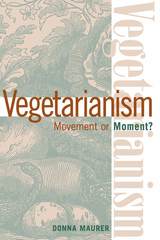
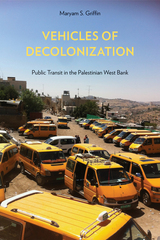
Examining the border-enclosure strategy Israel uses to impose Palestinian im/mobilization, Maryam Griffin considers the ways public transportation in the Palestinian West Bank is a constant site of social struggle. Her illuminating book, Vehicles of Decolonization, studies collective movement, resistance, and everyday life in the West Bank to show how Palestinians assert a kind of Indigenous self-determination over mobility that Israeli settler colonialism seeks to undermine.
Having immersed herself in a year of fieldwork, Griffin maps multiple engagements with the flexible bus, shared van, and private taxi services to demonstrate that the politics of mobility are shaped by ongoing settler colonialism and Indigenous struggle. Griffin uses critical border studies to look at the contested nature of mobility at the sites of transit, where Palestinians practice self-determination through routine participation, spectacular political organizing and demonstration, and artistic renderings.
Featuring a variety of street images, Vehicles of Decolonization shows that multiple registers of people power work in concert not only to resist settler colonial logics but to reinhabit the land through the practice and preservation of alternative relations of mobility.
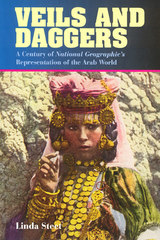
In Veils and Daggers, Linda Steet provides a critically insightful and alternative interpretation of National Geographic. Through an analysis of the journal's discourses in Orientalism, patriarchy, and primitivism in the Arab world as well as textual and visual constructions of Arab men and women, Islam, and Arab culture, Veils and Daggers unpacks the ideological perspectives that have guided National Geographic throughout its history. Drawing on cultural, feminist, and postcolonial criticism, Steet generates alternative readings that challenge the magazine's claims to objectivity. In this fascinating journey, it becomes clear that neither text nor image in the magazine can be regarded as natural or self-evident and she artfully demonstrates that the act of representing others "inevitably involves some degree of violence, decontextualization, minaturization, etc." The subject area known as Orientalism, she shows, is a manmade concept that as such must be studied as an integral component of the social, rather than the natural or divine world.
Veils and Daggers repositions and redefines National Geographic as an educational journal. Steet's work is an important and groundbreaking contribution in the area of social construction of knowledge, social foundations of education, popular educational media, and social studies as well as racial identity, ethnicity, gender. Once encountered, readers of National Geographic will never regard it in the same manner again.
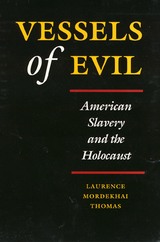
Two profound atrocities in the history of Western culture form the subject of this moving philosophical exploration: American Slavery and the Holocaust. An African American and a Jew, Laurence Mordekhai Thomas denounces efforts to place the suffering of one group above the other. Rather, he pronounces these two defining historical experiences as profoundly evil in radically different ways and points to their logically incompatible aims.
The author begins with a discussion of the nature of evil, exploring the fragility of human beings and the phenomena of compartmentalizing, unquestioning obedience to authority, and moral drift. Citing compelling examples from history and contemporary life, he characterizes evil acts in terms of moral agency, magnitude, and intent.
With moving testimony, Thomas depicts the moral pain of African Americans and Jews during their ordeals and describes how their past as victims has affected their future. Without invidious comparison, he distinguishes between extermination and domination, death and natal alienation, physical and mental cruelty, and between being viewed as irredeemable evil and as a moral simpleton. Thomas also considers the role of blacks and Jews in the Christian narrative.
In Vessels of Evil, Thomas also considers the ways Jews and blacks have gone on to survive. He analyzes the relative flourishing of Jews and the languishing of blacks in this country and examines the implications of their dissimilar tragedies on any future relationship between these two minorities.

Part of a look-alike generation of all-purpose stadiums erected around the country, the Vet took on its own personality over the years. For all its deficiencies, it left fans loving it in the way they loved their own families—warts and all. Almost 100 photographs and Rich Westcott's yarns make Veterans Stadium the one book that will help Philadelphians—and Philadelphia visitors—remember thirty years of their history.
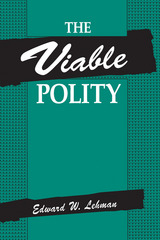
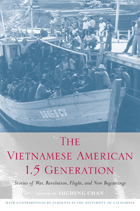
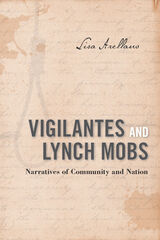
Looking at the narrative accounts of mob violence produced by vigilantes and their advocates as “official” histories, Lisa Arellano shows how these nonfiction narratives conformed to a common formula whose purpose was to legitimate frontier justice and lynching.
In Vigilantes and Lynch Mobs, Arellano closely examines such narratives as well as the work of Western historian and archivist Hubert Howe Bancroft, who was sympathetic to them, and that of Ida B. Wells, who wrote in fierce opposition to lynching. Tracing the creation, maintenance, and circulation of dominant, alternative, and oppositional vigilante stories from the nineteenth-century frontier through the Jim Crow South, she casts new light on the role of narrative in creating a knowable past.
Demonstrating how these histories ennobled the actions of mobs and rendered their leaders and members as heroes, Arellano presents a persuasive account of lynching’s power to create the conditions favorable to its own existence.
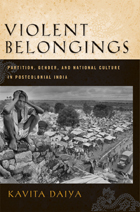
In addition to challenging the official narratives of independence and Partition, these narratives challenge our contemporary understanding of gender and ethnicity in history and politics. Violent Belongings argues that both male and female bodies, and heterosexual coupledom, became symbols of the nation in public life. In the newly independent Indian nation both men and women were transformed into ideal citizens or troubling bodies, immigrants or refugees, depending on whether they were ethnically Hindu, Muslim, Jewish or Sikh. The divisions set in motion during Partition continue into our own time and account for ethnic violence in South Asia.
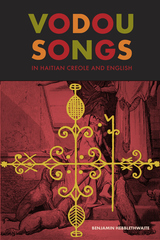
Vodou songs constitute the living memory of Haitian Vodou communities, and song texts are key elements to understanding Haitian culture. Vodou songs form a profound religious and cultural heritage that traverses the past and refreshes the present. Offering a one-of-a-kind research tool on Vodou and its cultural roots in Haiti and pre-Haitian regions, Vodou Songs in Haitian Creole and English provides a substantial selection of hard to find or unpublished sacred Vodou songs in a side-by-side bilingual format.
Esteemed scholar Benjamin Hebblethwaite introduces the language, mythology, philosophy, origins, and culture of Vodou through several chapters of source songs plus separate analytical chapters. He guides readers through songs, chants, poems, magical formulae, invocations, prayers, historical texts and interviews, as well as Haitian Creole grammar and original sacred literature. An in-depth dictionary of key Vodou terms and concepts is also provided.
This corpus of songs and the research about them provide a crucial understanding of the meaning of Vodou religion, language, and culture.

Barlow, whose voice has been heard on WPFW (Washington, D.C.) for many years, brings an insider's knowledge to this account of black radio as a predominantly local and still powerful medium. Many of the broadcasters he profiles -- Jack Cooper, Paul Robeson, Richard Durham, Cathy Hughes, Al Benson, Georgie Woods, Peggy Mitchell, Hal Jackson, Jocko Henderson, Mary Mason, Wesley South, Martha Jean "the Queen" Steinberg, to name a few -- became not only celebrities but also respected members of their communities. Atlanta's Jack "the Rapper" Gibson, for instance, tells how he literally shared his microphone with Rev. Martin Luther King Jr. to announce meetings and rally listeners around a key issue. By showing the extent to which so many black broadcasters achieved the status of trusted and influential community leaders, Barlow acknowledges that their grassroots activism was an indispensable and often overlooked part of the ongoing African American civil rights movement.
Voice Over also addresses black radio's broadly significant role in entertainment and shifting race relations. Until the rock and roll revolution, audiences had largely been segregated. The African American personality jocks who introduced white teens to rhythm and blues were a revelation; their wild style and personas and the music they played changed broadcasting while it enthralled a multiracial audience. Although the stations that introduced the enormously popular music were identified as black, virtually none was black-owned or managed. The broadcasters who distanced themselves from music industry perks and payoffs proposed an ambitious agenda for change. This little-known story sets the stage for how the proliferation of black-owned stations and networks occurred and for Barlow's assessment of the instability of today's black radio scene.
Written for a broad spectrum of readers -- from nostalgic fans of Jocko and Georgie Woods to loyal listeners of surviving stations and media watchers committed to diversity in broadcasting -- Voice Over tells the whole story of the making of black radio.
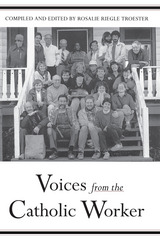
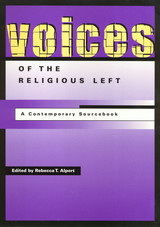
The academics and activists who write this rich volume, edited by Rebecca Alpert, argue passionately on topics that concern all of us. Quoting from the Bible, the Torah, the Qur'an, the teachings of Buddha, as well as Native American folklore, they make the voices of the religious left heard -- teaching lessons of peace and liberation.
As this invaluable sourcebook shows, the religious left is committed to issues of human rights and dignity. Answering questions of identity and ideology, the essays included here stem from the "culture wars" that have divided orthodox and liberal believers. Responding to the needs of and raised by marginalized social groups, the writers discuss economic issues and religious politics as they champion equal rights, and promote the teaching of progressive vision.
Containing insightful perspectives of adherents to many faiths, Voices of the Religious Left makes it clear that there is a group dedicated to instilling the values of justice and freedom. They are far from silent.
All of the essays in this collection "...represent the power of the written word as a vehicle for advocacy and social change....It is my hope that the readers of these essays will themselves feel compelled to think more about the importance of taking a stand on issues from religious perspectives, and to act on something that compels them." --Rabbi Rebecca Alpert
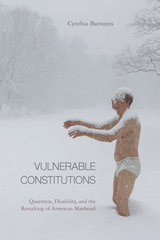
Amputation need not always signify castration; indeed, in Jack London’s fiction, losing a limb becomes part of a process through which queerly gendered men become properly masculinized. In her astute book, Vulnerable Constitutions, Cynthia Barounis explores the way American writers have fashioned alternative—even resistant—epistemologies of queerness, disability, and masculinity. She seeks to understand the way perverse sexuality, physical damage, and bodily contamination have stimulated—rather than created a crisis for—masculine characters in twentieth- and early twenty-first-century literature.
Barounis introduces the concept of “anti-prophylactic citizenship”—a mode of political belonging characterized by vulnerability, receptivity, and risk—to examine counternarratives of American masculinity. Investigating the work of authors including London, William Faulkner, James Baldwin, and Eli Clare, she presents an evolving narrative of medicalized sexuality and anti-prophylactic masculinity. Her literary readings interweave queer theory, disability studies, and the history of medicine to demonstrate how evolving scientific conversations around deviant genders and sexualities gave rise to a new model of national belonging—ultimately rewriting the story of American masculinity as a story of queer-crip rebellion.
READERS
Browse our collection.
PUBLISHERS
See BiblioVault's publisher services.
STUDENT SERVICES
Files for college accessibility offices.
UChicago Accessibility Resources
home | accessibility | search | about | contact us
BiblioVault ® 2001 - 2024
The University of Chicago Press









